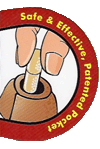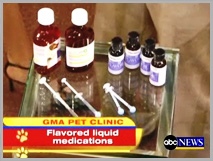Putting the
TREAT in treatments
with new products
By Dr. Marty
Becker
McClatchy-Tribune
News Service
Now at
www.petconnection.com
Our pets need
medicine but don't
want to take it. A
recent KLB marketing
study revealed that
only 10 percent of
cat owners and 30
percent of dog
owners succeed in
medicating their
pets correctly. What
this means is that a
lot of prescriptions
sent home by the
veterinarian end up
in the cupboard
rather than in the
pet, and the pet
owner is too
embarrassed or
hesitant to go back
to the veterinarian
and admit failure.
It's very
important that a pet
owner give
medications, at
precise intervals,
for as long as the
veterinarian has
prescribed. Failure
to do so can not
only can hinder the
pet's recovery from
a condition or
illness, but
medication-battles
(cats under the bed,
prying dog's mouths
open) can have a
negative emotional
impact on the pet
and the Bond we
share with them as
well.
Seeing medicine
clutched in your
hand, pets are often
as unwilling and
fearful as young
children are when it
comes to taking
wonder drugs. Many
humans feel
uncomfortable taking
pills and don't like
to push one down
their pet's throat,
perhaps for good
reason. Pets can
read human body
language and if you
feel guilty, they
pick that up and
respond as if being
punished.
Instead, act
JOLLY!
Luckily, pet
medications are no
longer just a
"bitter pill to
swallow."
Prescriptions can
now be disguised
inside of tasty
coverings, or can be
compounded into
tantalizing chewable
tablets and savory
liquids.
To get the meds
out of the bottle
and into the pet try
these new products:
1. Flavor-Doh
- Kinda like Play-Doh,
but in flavors like
fish and chicken for
cats and liver or
chicken for dogs.
You follow three
steps: pinch off a
portion, wrap the
pill/capsule until
completely covered
to conceal the
medicinal odor, and
then offer to your
pet like a treat.
(Ask for a "sit"
first, if that is
your norm.) Product
can be customized to
fit any size pill or
capsule.
www.flavordoh.com

2. Pill Pockets
- These are a
healthy treat with a
patented pocket to
safely conceal the
medicine. In savory
flavors like beef
and chicken for dogs
and chicken and
salmon for cats,
they come in four
sizes for dogs and
one size for cats.
www.pillpockets.com
3. FLAVORx
system - These
savory liquids are
custom compounded to
disguise liquid
medicines to the
veterinarian's
specifications and
are per
prescription. More
than 35,000 North
American pharmacies
(including Walgreens,
CVS and Wal-Mart)
use this system, as
do an increasing
number of
veterinarians.
Studies indicate
that 50 percent of
pets will take
medicine right off
of spoon; the other
50 percent from
dispensing syringe.
The volumes are very
small (.5-1cc for
cats, 1-2cc for
dogs, and .25 cc for
exotics). Popular
flavors for dogs are
red angus beef,
salmon steak,
chicken pot pie,
bubble gum and
groovy grape. Cats
can't stomach
anything too sweet
but love salty
flavors such as
bacon or salmon
steak. Salmon steak
is the number one
flavor for dogs and
cats; ferrets and
gerbils love bubble
gum and groovy
grape; reptiles and
rodents love mom's
banana bread; and
horses prefer gooey
molasses and tangy
apple. To find out
who in your
community offers the FLAVORx system visit
www.flavorx.com.
too sweet
but love salty
flavors such as
bacon or salmon
steak. Salmon steak
is the number one
flavor for dogs and
cats; ferrets and
gerbils love bubble
gum and groovy
grape; reptiles and
rodents love mom's
banana bread; and
horses prefer gooey
molasses and tangy
apple. To find out
who in your
community offers the FLAVORx system visit
www.flavorx.com.
4. VetChews -
VetChews are an
example of a soft,
easy-to-chew,
medicated pet treats
which are custom
compounded to the
veterinarian's
specifications and
are per
prescription. BCP
Veterinary Pharmacy
is a compounding
pharmacy in Houston,
Texas, that offers
to send home a
"taste test" with
tabs without
medication of the
flavors to determine
your pet's favorite
flavor before hand.
VetChew treats
are in chicken,
liver, beef, tuna,
shrimp and seafood
flavors for dogs and
cats. Yogurt or
peanut butter are
offered for rabbits
and ferrets; alfalfa
for small animals
such as hamsters or
gerbils; sweet feed
and alfalfa for
horses; banana,
apple, raspberry or
raisin for monkeys.
The average cost is
35 cents to $1 per
VetChew.
www.BCPVetPharm.com
Using these
new products can
change pet-medicine
"treatments" into "TREATments."
Always check with your
veterinarian first or start with
a pet behavior analysis and Dr.
Rolan Tripp who will coordinate
with your veterinarian.
Dr. Marty
Becker
is the
resident
veterinarian
on "Good
Morning
America" and
the author
of two new
books, "Why
Do Dogs
Drink Out Of
Toilets?"
and "Do Cats
Always Land
On Their
Feet?" Write
to him in
care of
www.petconnection.com